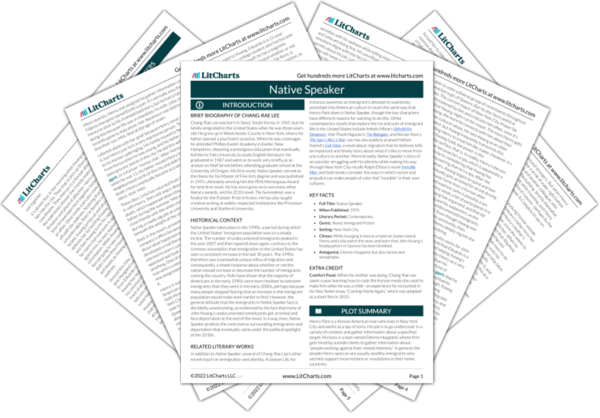In Native Speaker, the concept of a ggeh, or a Korean “money club,” symbolizes the power that can arise when community members come together and support each other. Henry’s father, for instance, is able to open his first grocery store because he belongs to a small ggeh, to which he and other Korean men contribute money on a rolling basis with the knowledge that—at some point—they will receive a large amount for themselves. This system enables Henry’s father and his fellow Korean immigrants to fund their business ventures and become successful in the United States—something they might not have been able to do without the communal approach to funding.
As somebody who understands how powerful and productive it can be to unite a community in this way, John Kwang establishes a large-scale ggeh for any of his constituents who want to participate, thus bringing the Korean tradition to other racial and ethnic groups living in Queens. At first, it works quite well, giving his constituents something resembling financial stability in times of need. However, the ggeh soon attracts suspicion from the government, which disapproves of the concept because it doesn’t report earnings to the tax authorities. Through Glimmer & Company (and, in turn, through Henry), the Immigration and Naturalization Service ends up obtaining the list of people who belong to the ggeh, and it uses this list as a way of identifying and deporting undocumented immigrants. The ggeh therefore comes to represent not just the power of unity and communal support, but also the unfortunate fact that Americans in positions of power are often deeply suspicious of foreign practices and traditions that empower new Americans.
The Ggeh (The “Money Club”) Quotes in Native Speaker
I know over the years my father and his friends got together less and less. Certainly, after my mother died, he didn’t seem to want to go to the gatherings anymore. But it wasn’t just him. They all got busier and wealthier and lived farther and farther apart. Like us, their families moved to big houses with big yards to tend on weekends, they owned fancy cars that needed washing and waxing. They joined their own neighborhood pool and tennis clubs and were making drinking friends with Americans. […] And in the end my father no longer belonged to any ggeh, he complained about all the disgraceful troubles that were now cropping up, people not paying on time or leaving too soon after their turn getting the money. In America, he said, it’s even hard to stay Korean.

Unlock explanations and citation info for this and every other Native Speaker quote.
Plus so much more...
Get LitCharts A+“And if they do not have the same strong community you enjoy, the one you brought with you from Korea, which can pool money and efforts for its members—it is because this community has been broken and dissolved through history. […] Know that what we have in common, the sadness and pain and injustice, will always be stronger than our differences. I respect and honor you deeply.”












